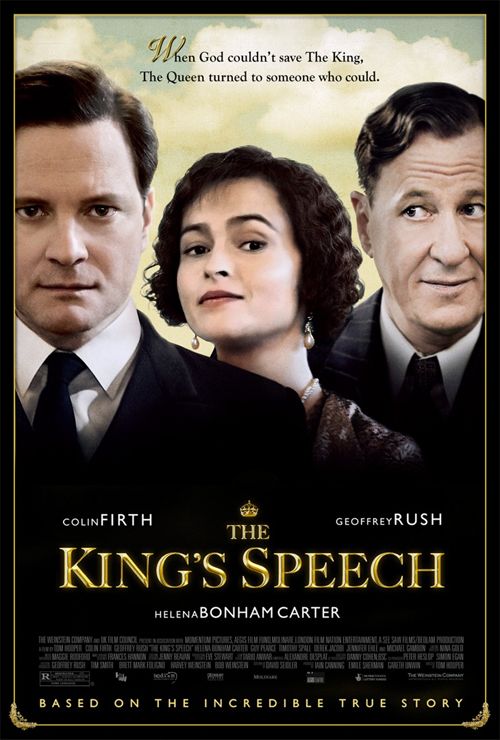Be Heard
Director
Tom Hooper
Starring
Colin Firth
Helena Bonham Carter
Geoffrey Rush
I don’t like using the words ‘perfect film’, I try my utmost never to print or say them. In truth, there is no such thing as a perfect film. I will agree that a perfect cinematic experience, flawless film-making, exceptional acting, etc. are adequate notes of praise but if the perfect film were created, we would have no need to attempt another. So, what is The King’s Speech, then? Well, I want to say it’s the aforementioned phrase but as I am physically incapable, I will simply state that it is an exemplary example of cinema and a truly glorious release.
Originally written as a play, this is the story of Prince Albert (later King George VI) [Firth] and his attempts to overcome his speech impediment before reluctantly taking the throne of Great Britain. The film opens with a comparative shot of a professionally trained broadcaster going through his routine – including such acts as gargling whiskey – and Prince Albert failing to deliver the closing speech of the Empire Exhibition, in front of thousands of unsettled and disappointed subjects. Albert takes some comfort knowing that his brother David [Guy Pearce] is next in line for the throne and subsequently, his speech difficulties will never be a matter of national concern. Despite this, his wife, Elizabeth [Bonham-Carter] wishing to aid her husband in any way she can, contacts various speech therapists. Having consulted many respected officials, Elizabeth pursues the highly unconventional Australian, Lionel Logue [Rush], who agrees to treat Albert, provided his methods are not questioned. After an initial meeting, Albert becomes incredibly frustrated by the prying questions and Logue’s manner and storms out. Having listened to a recording made by Logue, of Albert speaking without hesitation or stuttering, the sessions resume. Adding complication to the matter, David and Albert’s father, King George V [Michael Gambon] passes away and David inherits the throne – a fact which Parliament will not support, due to his pursuit of a twice-divorced American. With war in Europe approaching and general support for Albert to replace his brother, pressure mounts and Logue’s efforts must double in order to aid the king in his first live war-time broadcast.
As stated, this film was originally written as a play and with so few locations and supporting characters, it really shows. Subsequently, the strong focus on the characters and their relationships provides ample opportunity for Firth, Rush and Bonham-Carter to really demonstrate something extraordinarily memorable and endearing. Despite being hired to simply ‘cure’ the Prince-cum-King, Logue acts more as personal councillor and therapist; as such we are offered a look into the claustrophobic world of royal society in the 1930’s and the cruel rebranding and sometimes medieval methods to retrain those who were different. In addition to the fine performances, the technical aspects are equally astounding. Tom Hooper has utilised his signature look (used so beautifully in John Adams) to create a very unique style to what could have easily been batted off as a standard period drama.
Brilliantly paced, whilst exploring the surface of the three lead characters, the only complaint I could possibly raise – were I forced to – would be the limitations placed on the supporting roles by the scripts’ format. I personally believe that adopting a theatrically styled script yields better results when put to cinema, then one written specifically for the screen – if only for the fact that I relish long, drawn-out confrontational monologues in the hands of noteworthy actors. On the downside, we lose a lot of backstory and exposition, other than that of instances reported by the leads. Excluding that, this movie is without a doubt one of this year’s finest and certainly the best of British cinema in a long time.
Release Date:
7th January 2011
The Scene To Look Out For:
Of the many memorable scenes, one that seemed to stand out to me was the crippling effect Albert’s impediment had on his family life. The fact that his short bedtime story for his two daughters is drawn-out and often interrupted, greatly affects the family, despite his overwhelming feelings for them all. A fact made equally morose by his daughters’ change in greeting once he is crowned king. All very simple but effective.
Notable Characters:
To isolate the performance of one of the three key leads, would greatly do disservice to the others, simply because they genuinely require one another; without one bringing their a-game, the film would be flat. Firth’s performance as Prince Albert is one of a troubled father and a frustrated individual of great responsibility. Almost instantaneously (largely due to the Empire Exhibition scene) audiences pledge their allegiance to him and exude infinite sympathy. Helena Bonham-Carter as the ever-supportive wife, crushed by her husband’s inabilities and frustrations is equally heart-breaking and certainly one of the high-points in her career. Finally, Geoffrey Rush’s presence as the plain speaking common-man adds much needed humour and immense heart to the entire proceedings. Each performance is spellbinding and worthy of the highest accolades this industry has to offer.
Highlighted Quote:
“My castle, my rules”
In A Few Words:
“A stunning, beautiful, evocative, charming and wholly delightful affair”
Total Score: 5/5
![The Red Right Hand Movie Reviews [Matthew Stogdon]](https://reviews.theredrighthand.co.uk/wp-content/uploads/2021/12/cropped-header1.png)




